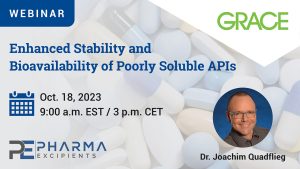Polyenylphosphatidylcholines as bioactive excipient in tablets for the treatment of liver fibrosis

Liver fibrosis is a condition characterized by the accumulation of extracellular matrix (ECM) arising from the myofibroblastic transdifferentiation of hepatic stellate cells (HSCs) occurring as the natural response to liver damage. To date, no pharmacological treatments have been specifically approved for liver fibrosis. We recently reported a beneficial effect of polyenylphosphatidylcholines (PPCs)-rich formulations in reverting fibrogenic features of HSCs. However, unsaturated phospholipids’ properties pose a constant challenge to the development of tablets as preferred patient-centric dosage form. Profiting from the advantageous physical properties of the PPCs-rich Soluthin® S 80 M, we developed a tablet formulation incorporating 70% w/w of this bioactive lipid.
Tablets were characterized via X-ray powder diffraction, thermogravimetry, and Raman confocal imaging, and passed the major compendial requirements. To mimic physiological absorption after oral intake, phospholipids extracted from tablets were reconstituted as protein-free chylomicron (PFC)-like emulsions and tested on the fibrogenic human HSC line LX-2 and on primary cirrhotic rat hepatic stellate cells (PRHSC). Lipids extracted from tablets and reconstituted in buffer or as PFC-like emulsions exerted the same antifibrotic effect on both activated LX-2 and PRHSCs as observed with plain S 80 M liposomes, showing that the manufacturing process did not interfere with the bioactivity of PPCs.
Download the full article as PDF here Polyenylphosphatidylcholines as bioactive excipient in tablets for the treatment of liver fibrosis
or read it here
Materials
Soluthin® S 80 M (S 80 M, soybean phospholipid 80% complexed with MgCl2), and 1,2-dioleoyl-sn-glycero-3-phosphocholine (DOPC) were a kind gift from Lipoid GmbH (Ludwigshafen, Germany). The LX-2 cells immortalized human HSC line (RRID: CVCL_5792) were purchased from Merck Millipore (Darmstadt, Germany). LX-2 cells originate from LX-1 cells that were obtained from isolated human HSCs and immortalized with Symian virus 40 (SV40) large T antigen that are grown in 10% foetal bovine serum (FBS) by selecting a single clone subline from the outgrowth able to be cultured in low FBS concentration (1%) and are usually cultured in 2% FBS. (Xu, 2005) Dulbecco’s Modified Eagle Medium (DMEM-HG, 4.5 g/L glucose, with phenol red and pyruvate, no glutamine), 4-(2-hydroxyethyl) piperazine-1-ethanesulfonic acid sodium (HEPES) solution, DMSO (dimethylsulphoxide), 4′,6-diamidino-2-phenylindole (DAPI), Roti®-Histofix 4% (acid-free, pH 7.4, % w/v phosphate-buffered formaldehyde solution) were purchased from Carl Roth (Arlesheim, Switzerland). Iscove’s Modified Dulbecco’s Medium (with phenol red and L-glutamine), phosphate buffer saline (PBS) (pH 7.4, without Ca/Mg), L-Glutamine, Penicillin-Streptomycin, microcrystalline cellulose (MCC), hydrochloric acid (HCl), sodium hydroxide (NaOH), chloroform (CHCl3), ethanol (EtOH), trifluoroacetic acid (TFA), isopropanol, acetone, methanol (MeOH), acetonitrile (ACN), TRIzol™ reagent, RNAse-free water were purchased from Fisher Scientific (Reinach, Switzerland). Foetal bovine serum (FBS), Accutase®, Cell Counting Kit-8 (CCK-8), 1,6-Diphenyl-1,3,5-hexatriene (DPH), N,N,N-trimethyl-4-(6-phenyl-1,3,5-hexatrien-1-yl)-phenyl-ammonium-p-toluolsulfonate (TMA-DPH), cholesterol, Oil Red O (ORO; 0.5% w/v in propylene glycol), collagen type I (from rat tail), triethyl citrate, and glycogen were bought from Sigma Aldrich (Buchs, Switzerland). Myritol® 318 triglycerides (produced by BASF Personal Care and Nutrition GmbH, Monheim am Rhein, Germany) were obtained from Impag (Zürich, Switzerland). Cell culture plates and flasks were from Sarstedt (Nümbrecht, Germany), TPP (Trasadingen, Switzerland) and Nunc (Roskilde, Denmark). ROS-ID® Total ROS/Superoxide detection kit was from Enzo Life Science (Lausen, Switzerland).
Neusilin® US2 (Fuji Chemical Industries Co., Ltd., Toyoma, Japan) was a kind gift from IMCD (Zürich, Switzerland). Primellose® was a kind gift from DFE Pharma (Goch, Germany). The enteric methacrylic acid copolymer Eudragit® L100-55 was a kind gift from Evonik (Essen, Germany).
Ivo Skorup, Gina Valentino, Simone Aleandri, Rita Gelli, Aymar Abel Ganguin, Eric Felli, Sonia Emilia Selicean, Rosanne Angela Marxer, Sarah Teworte, Ana Lucić, Jordi Gracia-Sancho, Annalisa Berzigotti, Francesca Ridi, Paola Luciani, Polyenylphosphatidylcholines as bioactive excipient in tablets for the treatment of liver fibrosis, International Journal of Pharmaceutics, 2023, 123473, ISSN 0378-5173, https://doi.org/10.1016/j.ijpharm.2023.123473.
See the webinar:
“Enhanced Stability and Bioavailability of Poorly Soluble APIs“,
18 October 2023:
Get more information & register here for free:


